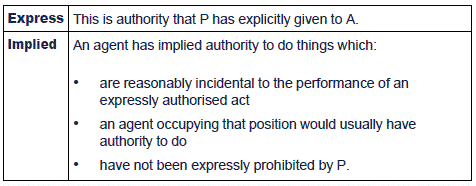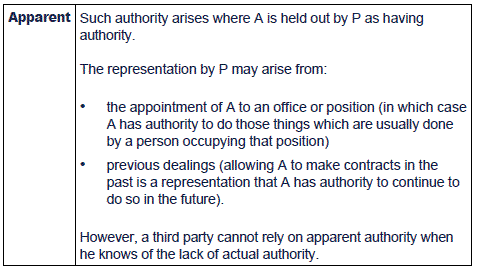Chapter 5: Agency law
Chapter learning objectives
Upon completion of this chapter you will be able to:
- define the role of the agent and give examples of such relationships, paying particular regard to partners and company directors
- explain how the agency relationship is established
- define the authority of the agent
- explain the potential liability of both principal and agent.
1 Definition of an agent
 An agent (A) is a person who is authorised to act for another (the principal (P)) in the making of legal relations with third parties.
An agent (A) is a person who is authorised to act for another (the principal (P)) in the making of legal relations with third parties.
The resulting contracts are made between the principal and the third party, and not directly with the agent.
An agency relationship exists in lots of situations:
- A director acts as an agent for his company.
- A partner acts as an agent for his partnership.
- An estate agent is appointed by a seller of a house to find a buyer.
- A travel agent is appointed by a holiday company to make bookings with customers.
2 How the agency relationship arises
Introduction
An agency relationship can be established in one of five ways:
- express agreement
- implied agreement
- by necessity
- by ratification
- by estoppel.
Express agreement
This is where P actually appoints A as his agent. The agreement can be made orally or in writing.
Implied agreement
This is where P has not expressly agreed that A should be his agent. However, the agreement can be implied from the parties' conduct or relationship.
By necessity
This requires four conditions to be satisfied:
- P's property is entrusted to A
- an emergency arises making it necessary for A to act
- it is not possible to communicate with P
- A acts in the interest of P.
Great Northern Railway v Swaffield (1874)

By ratification
If a properly appointed agent exceeds his authority, or a person having no authority purports to act as an agent, the principal has no liability on that contract unless the principal 'ratifies' the contract.
The effect of ratification is to backdate A's authority to act as agent. This requires P to:
- have the contractual capacity to make the contract
- have been in existence both when the contract was made and at the date of ratification
- be identified when the contract is made
- be aware of all the material facts
- clearly signify his intention to ratify the whole contract within a reasonable time.
Note that a void or illegal contract cannot be ratified.
Kelner v Baxter (1866)

By estoppel
This arises where P implies that A is his agent even though he is not. He is then prevented or 'stopped' from denying A's authority.
Freeman & Lockyer v Buckhurst Park Properties Ltd (1964)


 Test your understanding 1
Test your understanding 1
Peter advertised his car for sale in a local newspaper and then went on holiday leaving his car in the drive. While Peter was away, Tom, having seen the advertisement, went to look at the car and decided to make an offer for it. Peter's neighbour, Alf, pretending to act with Peter's authority, entered into negotiations with Tom and eventually accepted Tom's offer on Peter's behalf.
Alf had no authority to act in this way. When Peter returned from his holiday, he wrote to Tom saying that he was ratifying Alf's act.
Advise Tom as to whether he is bound by the contract.

3 Authority
The authority of an agent is a central issue in the concept of agency. It determines:
- the powers that the agent has on behalf of the principal, and
- for which acts the principal is liable.
If the agent exceeds his powers the principal may still be liable to the third party, but he may have rights against the agent for breach of contract.
There are three ways in which authority may be given:




 Test your understanding 2
Test your understanding 2
Harry wanted to insure the contents of his house against all loss and damage and appointed Colin to effect a policy, instructing him to 'insure any furniture'. Having obtained quotes from various companies, Colin eventually took out insurance with Hawk Star Limited. Sometime later vandals broke into Harry's house and did substantial damage to his furniture. They did not steal anything. When Harry claimed, Hawk Star refused to pay as the policy covered loss by theft or fire but not damage by vandals.
Advise Harry as to whether he can recover the value of damaged furniture from Colin.

4 Liability
Where the agent acts for a disclosed principal
A principal is disclosed where the existence of the principal has been made known to the third party. It is not necessary for the principal to be identified to the third party.
As a general rule, the contract is between the principal and the third party. The agent is neither liable nor entitled under the contract. However, the agent will be personally liable in the following exceptional circumstances:
- where the agent showed an intention to undertake personal liability, e.g. by signing a written contract in his own name
- trade usage or custom
- where the agent refuses to identify the principal
- where the agent is acting on behalf of a fictitious principal.
Where the agent acts for an undisclosed principal
An undisclosed principal is where the principal's existence has not been made known to the third party. When the third party discovers the existence of P, he can elect to treat P or A as bound by the transaction.
Agent's fiduciary duty
An agent has a fiduciary relationship with his principal. This is a position similar to that of a trustee. It has the following consequences:
- A must not allow his personal interests to conflict with those of P.
- A must always act in the best interests of P.
- A must not make a secret profit.
- A has a duty to account to P for all money and property received.
Where an agent is in breach of his fiduciary duty, the following remedies are available:
- P can repudiate the contract with the third party.
- A can be dismissed without notice.
- P can refuse to pay any money owed to A or recover any money already paid.
- P can recover any secret profit made or any bribe.
Principal's liability to the agent
The agent has the right:
5 Chapter summary
Test your understanding answers

 Test your understanding 1
Test your understanding 1
Where a person purports to act as another's agent, even though he has no authority to do so, the principal is only bound by the contract if he decides to ratify it.
The principal can only ratify the contract if certain requirements are satisfied. The principal must have the contractual capacity to make the contract both at the time the contract is made and at the time of ratification. The principal must have been identified to the third party at the time the contract was made.
The principal must be aware of all material facts and ratify the contract within a reasonable time. The principal must ratify the whole contract.
It would appear that all these requirements can be satisfied in this situation. Therefore Peter is able to ratify the contract.
When the principal ratifies the contract, it is binding on the parties from the date on which it was originally made. Therefore Tom is bound by the contract.


 Test your understanding 2
Test your understanding 2
When an agent is appointed, he is given express authority to act on behalf of the principal. However, where the terms of authority are ambiguous or where the agent is given discretion to act the law implies authority to enable an agent to carry out his express duties. The agent must always act in the best interests of the principal.
Colin's authority is very ambiguous. He can decide which policy to take out 'to insure the principal's furniture'.
If Colin can show that when he made the decision to take this policy as opposed to any other, that he was acting in Harry's best interests, Colin will be acting within his authority. Harry will not be able to recover the value of the damaged furniture from Colin.

|
Created at 5/24/2012 3:12 PM by System Account
(GMT) Greenwich Mean Time : Dublin, Edinburgh, Lisbon, London
|
Last modified at 8/21/2012 9:52 AM by System Account
(GMT) Greenwich Mean Time : Dublin, Edinburgh, Lisbon, London
|
|
|
|
 |
Rating
:
|
 Ratings & Comments
(Click the stars to rate the page) Ratings & Comments
(Click the stars to rate the page)
|
 |
Tags:
|
|
|
|
|